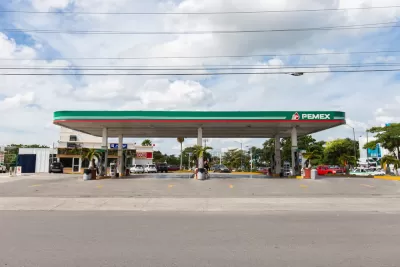Mexico began deregulation of gasoline prices to the dismay of motorists, as gas prices jumped about 20 percent on New Year's Day. People are so upset that pundits suggest the decision may imperil President Enrique Peña Nieto's re-election next year.

"Mexican motorists awoke to a shock as gasoline prices at the pump shot up by more than 20 percent in some corners of the country on the first day of the year, sparking panic buying, street protests and even a call by one prominent lawmaker for a 'peaceful revolution'," reports David Agren for The Washington Post.
Regular gas is scheduled to sell for 15.99 pesos per liter in Mexico City (about $2.85 per gallon), though prices will vary across the country.
That's over 20 percent higher that U.S. gas prices which averaged $2.353 on Jan.4, according to AAA. However, gasoline prices in Mexico are set by government for historic reasons, explains Agren.
Mexicans have long been used to low prices at the pump. Mexico expropriated the country's oil industry in 1938 and kicked out foreign oil companies, a move celebrated by Mexicans as a seminal act of sovereignty. Most Mexicans associate its nationalized oil industry with cheap gas.
However, Mexico now imports about half the gasoline it consumes. In a separate article, Maria Verza of the Associated Press reports on what Jorge Pinon, an energy expert at the University of Texas, Austin, described as "a total collapse of the refining system of Pemex."
The deregulation was prompted by budgetary reasons resulting from low oil prices. When oil prices were higher, the government would subsidize gas prices, which Mexicans had grown accustomed, notwithstanding some criticism.
"Some even pointed to the unfairness of the subsidies — which totaled approximately $20 billion in 2008 — saying the government spends more on cheap fuel for rich motorists (who collected much of the money) than on the budget for the National Autonomous University of Mexico," notes Agren.
This is not the first major energy change instituted by President Enrique Peña Nieto who proposed energy reforms in 2013 that allowed foreign investment in its state-owned oil company, Pemex for the first time since the expropriation in 1938. More recently, Planetizen correspondent Elana Eden reported on a carbon pricing demonstration project that was scheduled to begin in November 2016 "before launching a national carbon market in 2018."
FULL STORY: Mexicans are outraged over a big hike in gas prices on Jan. 1

Planetizen Federal Action Tracker
A weekly monitor of how Trump’s orders and actions are impacting planners and planning in America.

Chicago’s Ghost Rails
Just beneath the surface of the modern city lie the remnants of its expansive early 20th-century streetcar system.

San Antonio and Austin are Fusing Into one Massive Megaregion
The region spanning the two central Texas cities is growing fast, posing challenges for local infrastructure and water supplies.

Since Zion's Shuttles Went Electric “The Smog is Gone”
Visitors to Zion National Park can enjoy the canyon via the nation’s first fully electric park shuttle system.

Trump Distributing DOT Safety Funds at 1/10 Rate of Biden
Funds for Safe Streets and other transportation safety and equity programs are being held up by administrative reviews and conflicts with the Trump administration’s priorities.

German Cities Subsidize Taxis for Women Amid Wave of Violence
Free or low-cost taxi rides can help women navigate cities more safely, but critics say the programs don't address the root causes of violence against women.
Urban Design for Planners 1: Software Tools
This six-course series explores essential urban design concepts using open source software and equips planners with the tools they need to participate fully in the urban design process.
Planning for Universal Design
Learn the tools for implementing Universal Design in planning regulations.
planning NEXT
Appalachian Highlands Housing Partners
Mpact (founded as Rail~Volution)
City of Camden Redevelopment Agency
City of Astoria
City of Portland
City of Laramie


























